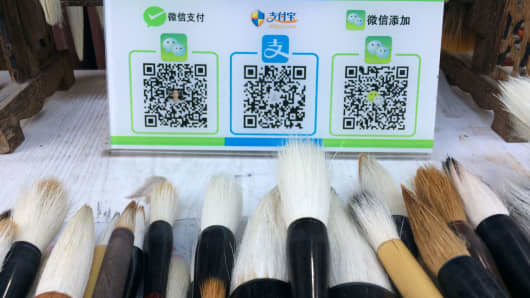Celebrity
DP Veteran
- Joined
- May 13, 2016
- Messages
- 5,257
- Reaction score
- 761
- Location
- VT, USA
- Gender
- Undisclosed
- Political Leaning
- Undisclosed
I'm not sure I would like to conduct only cashless transactions. So, it's a good thing I'm not Chinese.
I guess it would make sense in a country that wants to centralize their economy. This sort of technology meshes well with data collection. But I'm not sure how this will affect the Chinese people if their economy is expanding at the same time. Aren't Chinese businesses becoming less regulated?
We will have to wait and see what measures are taken to keep the population in check.
Oh, and don't forget to look out for creeping communism, America. Those mobile pay apps are really taking eastern Asia by storm. Wow. Maybe the apps will include propaganda ads to brainwash communists into thinking that the government is good and foreigners are bad.

Rather than, "Do you take credit card?" the question was often "Do you take Alipay? WeChat Pay?" The running joke was that street beggars would rather take a mobile donation rather than cash.
I guess it would make sense in a country that wants to centralize their economy. This sort of technology meshes well with data collection. But I'm not sure how this will affect the Chinese people if their economy is expanding at the same time. Aren't Chinese businesses becoming less regulated?
We will have to wait and see what measures are taken to keep the population in check.
Mobile payment volume in the country more than doubled to $5 trillion in 2016, according to Analysys data cited by Hillhouse Capital in a May report. In the first quarter of this year, Alipay had 54 percent of that mobile payments market, while WeChat Pay accounted for 40 percent, the study showed.
The Chinese mobile pay habit is also affecting other countries. More than 6 million Chinese traveled abroad during the "Golden Week" national holiday in early October, according to state-backed media outlet Xinhua. That puts pressure on popular tourist destinations like Japan and Hong Kong to add mobile pay services.
Oh, and don't forget to look out for creeping communism, America. Those mobile pay apps are really taking eastern Asia by storm. Wow. Maybe the apps will include propaganda ads to brainwash communists into thinking that the government is good and foreigners are bad.

https://www.cnbc.com/2017/10/08/china-is-living-the-future-of-mobile-pay-right-now.htmlCustomers can buy traditional Chinese calligraphy brushes at this Xi’an, China, store using QR payment codes. From left to right: WeChat Pay, Alipay and the QR code for the store’s WeChat account.
